China Arts & Entertainment
Rock Hotpot: Why Chinese Celebrities are Opening up Their Own Hot Pot Restaurants
It remains one of China’s favorite dining styles: hot pot (火锅), also known as Chinese fondue – a dish that never seems to go out of fashion. Why are so many Chinese celebrities opening up their own hot pot restaurants?
Published
9 years agoon
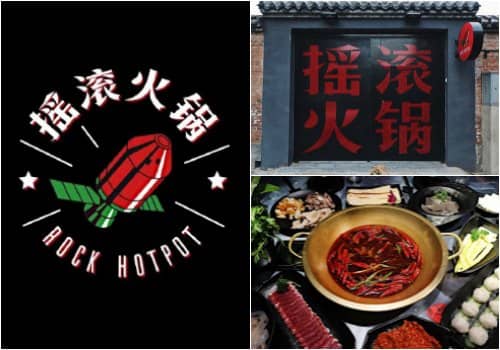
It is one of China’s favorite dining styles: hot pot (火锅), also known as Chinese fondue, an ancient dish that never seems to go out of fashion. In this special series, What’s on Weibo explores the latest trends in the world of Chinese hot pot. In this first issue: our recent visit to Beijing’s Rock Hotpot, owned by the popular Chinese rock band Second Hand Rose. Why is it a trend for Chinese celebrities to open up their own hot pot restaurant? (Check out our latest Weivlog here.)
It is a growing trend that started some years ago: Chinese celebrities are opening up their own hot pot restaurants across the country. Over the past few months, the celebrity hot pot boom has caught the attention of Chinese media sites and Weibo’s netizens, making ‘celebrity hotpot’ (明星火锅店) a much talked-about topic.
Alternative Beijing rock band Second Hand Rose (二手玫瑰) recently opened up its very first private hot pot place in Songzhuang, while the established celebrity hot pot chain ReLaYiHao just keeps getting more popular.
But there are also scandals; Chinese actor Bao Bei’er (包贝尔) was called out by Chinese state media earlier this year for serving fake duck blood in his hot pot joint.
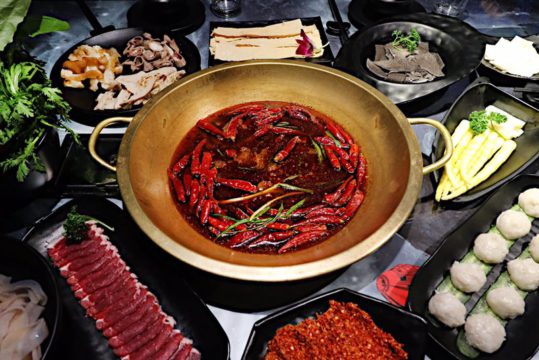
Spicy hotpot served by Second Hand Rose.
Chinese hot pot (huǒguō 火锅, literally: ‘fire pot’) has a history of over 1000 years. The tradition is thought to have derived from Mongol warriors who camped outside and had dinner together, circled around a pot on the fire.
The main idea is that while the hot pot brew is kept boiling, you place fresh ingredients into the pot and cook them at the table. Nowadays, hot pot tastes vary greatly across different regions in China, but what matters most is its enjoyment: sitting with friends and family around the boiling stew, sharing food, eating slowly, and talking.
Celebrity Hot Pots
Over the past five years, it has become a trend for Chinese stars to invest in hot pot chains or start their own restaurants. As early as 2009, Taiwanese singer and actor Nicky Wu (吴奇隆) was one of the early adopters when he started a Thai-style hot pot chain by the name of Lemon Leaf (柠檬叶子). He now has three restaurants in Taiwan, and one in Beijing.
Many other celebrities followed over the past three or four years. Since September 2016, Chinese actor Ren Quan (任泉) started the hotpot chain ReLaYiHao (热辣壹号) together with fellow celebrities Li Bingbing (李冰冰) and Huang Xiaoming (黄晓明). The chain now has branches from Beijing to Nanjing, and, according to the latest media reports, is fully packed every night.
Popular Chinese actress Deng Jiajia (邓家佳), born in Sichuan, also opened up her own ‘HI hotpot’ (HI辣火锅) in Beijing last year. Celebrities Eric Tsang (曾志伟), Chyi Chin (齐秦), Xu Zhiqian (薛之谦), and many others, have all opened up their own hot pot restaurants since 2013.

Ren Quan, Li Bingbing, and Huang Xiaoming: the famous investors behind the “Re La Yi Hao” hotpot chain.
The reason China’s celebrities love the concept of hot pot is simple. With a fanbase of millions, Chinese celebrities use their fame and influence to bring business to their restaurants. Chinese actor and entrepreneur Ren Quan, for example, has a staggering 11,5 million fans on his Weibo page – the perfect place to promote his latest hot pot branch.
The threshold for opening up a hot pot eatery is also low because it does not require as much professional knowledge as needed for other types of restaurants; for hot pot, a restaurant basically has to serve its customers a proper broth and the right ingredients. There is no need to hire high-end restaurant chefs. Hot pot restaurants are relatively easy to manage and need far fewer investment costs than many other types of restaurants.
Besides the fact that they are easy to set up and manage, there are other reasons why so many Chinese celebrities are choosing for this type of restaurant. It is a dining style that is suitable for all audiences, young and old, and is popular across China; no matter if you are in Beijing, Sichuan, or China’s coastal areas, there is a strong demand for Chinese fondue and a great freedom in varying between broth flavors and ingredients.
Lastly, the concept of hot pot itself is ideal for duplicating. Since many Chinese celebrities are choosing to start hot pot chains with multiple branches, this genre makes it easy to start the same model in various places. What’s not to love about it?
The Hot Pot Pitfall
As easy as it sounds, stepping into the hot pot business is not all roses for Chinese celebrities. In March of this year, Chinese actor Bao Bei’er (包贝尔) was caught in controversy when journalists exposed that the Harbin branch of his LaZhuang Huoguo (辣庄火锅) served its customers fake duck blood, a popular hot pot ingredient. The branch passed off cheap ox blood as duck blood, which is much more expensive.
Since Bao Bei’er is the face of the restaurant, it was him who became the target of netizens’ anger. The hashtag ‘Bao Bei’ers Restaurant Exposed’ (#包贝尔火锅店被曝#) was viewed more than a million times on Weibo.
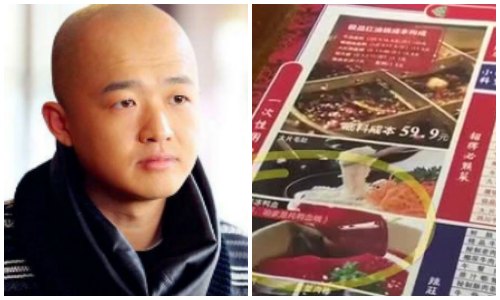
Pricy ox blood sold as ‘duck blood’ in Bao Bei’er’s hotpot restaurant.
Bao Bei’er later publicly apologized to his fans and customers, saying he took full responsibility for mismanaging his restaurants. As easy as setting up a hot pot place might be, it is essential for celebrities to ensure its service and quality. In the end, it is not the restaurant staff but the celebrity name that will be dragged through the mud if anything goes wrong.
Second Hand Rose: Rock Hotpot
Recently, another famous name has been added to the list of celebrity hot pot restaurants. Beijing rock band Second Hand Rose (二手玫瑰) opened its private hot pot diner ‘Rock Hotpot’ (摇滚火锅) in the Songzhuang art district, the biggest artist community in Beijing.
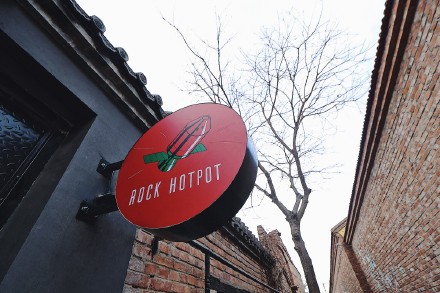
Rock Hotpot in Songzhuang, Beijing.
Lead singer Liang Long (梁龙) is a lover of both rock music and hot pot and initially opened the diner as a trial. Making all broths and sauces from scratch, each member of the band has his own soup base that reflects their personality. Customers can book their private table (there is just one private table available every night), or purchase the ingredients for takeaway hot pot.

Fresh sauces made from scratch at Rock Hotpot.
According to Liang Long, the hot pot restaurant only adds to the image of the band; both hot pot and rock music have the same powerful, quick-boiling “woosh” vibe to it.
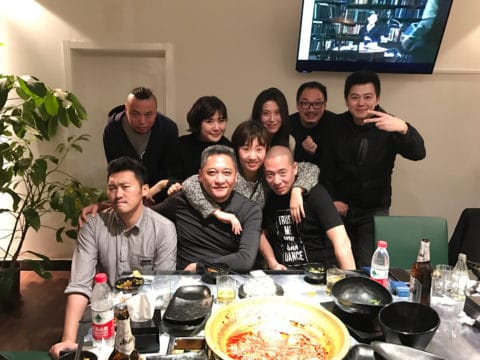
Fans can hang out with their favorite band at Rock Hotpot.
For now, the opening of Rock Hotpot has brought Second Hand Rose nothing but good things, Liang Long told What’s on Weibo. Not only does the band enjoy experimenting with different flavors and ingredients, the restaurant also brings them closer to their fans and friends who head out to Songzhuang for a night of hot pot together.

Private dining space at Second Hand Rose’s Rock Hotpot.
In the near future, Rock Hotpot hopes to open up a bigger restaurant to welcome more fans and food lover to their Rock Hotpot. They won’t be the only Chinese celebrities to do so – having hot pot with your idol is the latest hype in the world of showbiz and Chinese fondue.
Check out our visit to Rock hotpot in this video.
Rock Hotpot Address:
Beijing, Tongzhou District, Songzhuang Town, Xiaoqiao West Street No. 34.
北京宋庄,通州区宋庄镇小堡西街34号.
Reservations / Mr Wang: 13946228228
– By Manya Koetse
Follow @WhatsOnWeibo
©2017 Whatsonweibo. All rights reserved. Do not reproduce our content without permission – you can contact us at info@whatsonweibo.com.
Manya is the founder and editor-in-chief of What's on Weibo, offering independent analysis of social trends, online media, and digital culture in China for over a decade. Subscribe to gain access to content, including the Weibo Watch newsletter, which provides deeper insights into the China trends that matter. More about Manya at manyakoetse.com or follow on X.

China Arts & Entertainment
When an Entertainment Scandal Gets Political: How Wong Kar-wai Survived a Nationalist Storm
The 2025 scandal surrounding Wong Kar-wai shows that public outrage only produces consequences when it aligns with official interests.
Published
1 week agoon
December 18, 2025By
Ruixin Zhang
In 2025, Wong Kar-wai found himself at the center of one of China’s most explosive entertainment scandals of the year, one that began as a labor dispute and spiraled into a nationalist firestorm. But when this entertainment-industry controversy crossed into political red lines, something unexpected happened.
It’s safe to say that 2025 wasn’t the best year for Wong Kar-wai (王家卫, 1958), one of the most famous Chinese-language film directors in the world. The Hong Kong movie director is known for classic works like Chungking Express and In the Mood for Love. Besides his work, his iconic sunglasses are also famous – he rarely goes without them and is even nicknamed ‘Sunglasses’ (墨镜) or ‘Sunglass King’ (墨镜王) on Chinese social media.
But this year, discussions about Wong Kar-wai have gone well beyond his talent and looks. He became embroiled in what would turn into one of China’s biggest entertainment scandals of the year after a former staff member set out to expose him for exploitation and misconduct. Once the controversy spilled from entertainment into political territory, however, the dynamics of the story changed entirely.
A Fight for Credit
This story begins with the young Chinese screenwriter Gu Er (古二, real name Cheng Junnian 程骏年). He is the one who publicly accused Wong of exploitation and unethical work standards on social media (a story which we previously covered here).
Gu Er, a New York Film Academy graduate, returned to China after his studies and began building a career. In 2019, he joined the production team of Wong’s popular TV series Blossoms Shanghai, working long hours for meager pay, despite suffering from Kennedy’s disease, a motor neuron illness similar to ALS.

Cheng Junnian 程骏年, better known as Gu Er
In 2023, after the show premiered, Gu posted an article on Chinese social media titled “The Truth Behind the Writing of Blossoms” (《繁花》剧本的创作真相). He argued that he should have been credited as one of the principal writers but was instead listed only as a “preliminary editor,” buried at the end of the credits. The post sparked some discussion, but the controversy quickly faded.
It was not until last September that Gu Er released another essay titled “My Experience as a Screenwriter for Blossoms: A Summary” (我给《繁花》做编剧的经历——小结), which drew widespread attention. In the piece, he accused Wong Kar-wai of exploitation and detailed his creative work on the series, while also claiming that he was required to cook meals and run personal errands for Wong.
At one point, Gu Er describes how lead screenwriter Qin Wen (秦雯) allegedly tried to remove him from the production team after presenting his draft script as her own. According to Gu, Wong Kar-wai responded dismissively: “It’s just a few thousand yuan; he’s an assistant and can also write the script, it’s a bargain!”
Throughout 2025, Gu Er used his WeChat account to document his experiences and to upload audio recordings of conversations with members of the production team, including Wong Kar-wai and Qin Wen. These recordings were presented as evidence supporting his claims of exploitation, verbal abuse, and the denial of screenwriting credit.
In response to the controversy, the official account of the Blossoms Shanghai television series issued multiple statements denying that Gu Er deserved screenwriting credit and accusing him of abusing his position to secretly record private conversations among staff. The production team vowed to take legal action, and Gu Er’s entire WeChat account was soon shut down.
Leaked Recordings and Growing Backlash
Although his WeChat presence was erased, Gu Er refused to stay silent. In early November of 2025, he opened a new Weibo account (@古二新语) and, seemingly burning all of his bridges, continued releasing recordings involving Wong Kar-wai and members of the Blossoms Shanghai production team, triggering an unexpected shockwave over the past few weeks.
Gu Er released a series of audio recordings featuring Wong Kar-wai and others, including screenwriter Qin Wen and her assistant Xu Siyao (许思窈). In some of these recordings, they are heard mocking Gu Er; Qin appears to struggle to recall plot details she allegedly wrote herself; and Xu Siyao openly admits that an important storyline in Blossoms Shanghai originated from Gu Er’s writing.

Visuals from Blossoms Shanghai.
Wong Kar-wai and Qin Wen also spend a surprising amount of time ridiculing figures across the Chinese film and television industry, from respected senior veterans to obscure streaming-film directors, dismissively labeling them as “fake.”
What stunned the public even more were Wong Kar-wai’s crude remarks about actresses. In one recording, he comments on actress Jin Jing’s breasts and jokes, “I must get her” (“我一定要搞金靖”). Jin is not a major star, and in the final cut of Blossoms Shanghai, all of her scenes were removed. In another clip, Wong addresses screenwriter Qin Wen in a sexually suggestive and harassing tone, saying that if she had a body like Jin’s, she would not have “survived” her early years in the industry as a writer, because “I would definitely have taken you” (“我一定收你”).
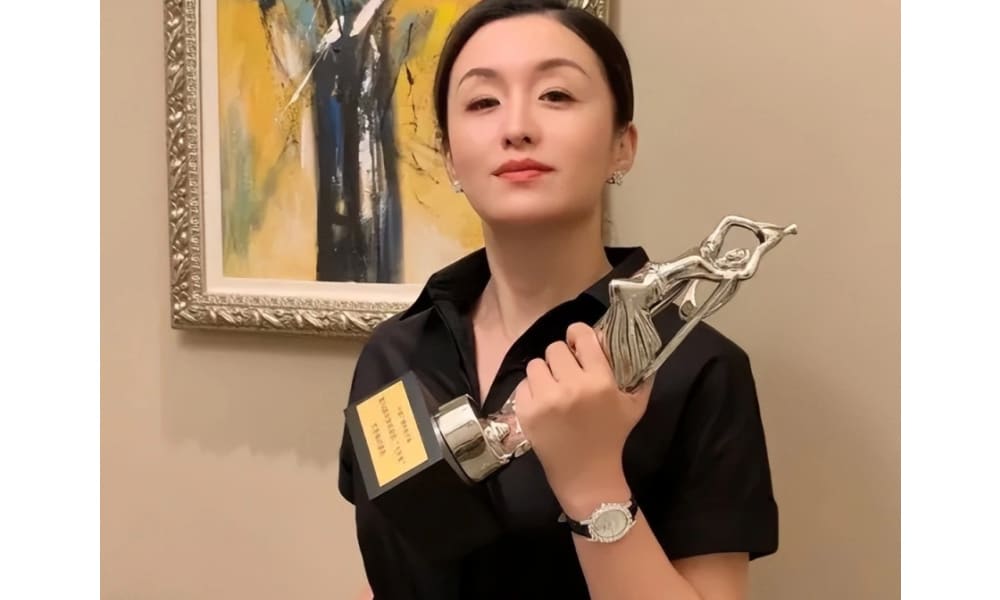
Qin Wen
After this wave of leaks, the recordings—together with Gu Er’s earlier accusations—spread widely across major Chinese social media platforms. Many netizens expressed disapproval of the misogyny, gossip, and backbiting revealed in the recordings and began reevaluating Wong Kar-wai as a person, as well as his past works. Others questioned the legitimacy of Gu Er’s methods, particularly the recordings and leaks. Legal experts noted that secretly recording conversations could violate privacy laws, and that selectively edited clips might even constitute defamation.
Crossing the Red Line
Then, on November 8, Gu Er released a new recording that fundamentally altered the nature of the incident. The audio features a conversation among Wong Kar-wai, Blossoms Shanghai co-director Li Shuang (李爽), and producer Peng Qihua (彭绮华), in which they discuss COVID controls, Japan, and China’s political system.
In the recording, Wong says that the Communist Party only wants “chives” (jiǔcài, 韭菜) to harvest and describes China as a “greedy one-party state.” In Chinese internet slang, jiǔcài refers to ordinary people who are repeatedly exploited, compared to chives that are cut and grow back, only to be harvested again. When Li mentions his collection of Japanese katanas and samurai outfits, Wong jokes that, given China’s current tensions with Japan, if the collection were discovered, Li would be publicly denounced and paraded, much like during the Cultural Revolution.
Wong even suggested: “If they find [the samurai swords], just put a Chinese flag on them and say you really hate those Japanese devils.”
The Weibo post was deleted within minutes, but the recordings spread quickly.
Nationalist netizens flooded Wong’s comment section, calling him a hànjiān (汉奸, traitor to the Chinese nation), and demanding that he “get out of China.” Some conspiracy-minded users even claimed that the title of Wong’s famous TV series Blossoms (繁花 fánhuā) was intentionally chosen because it sounds like “anti-China” (反华 fǎnhuá), alleging that Wong had embedded a subversive message in the title.
Suddenly, many who had previously viewed the scandal as mere entertainment began taking sides—calling for the show to be taken down and for investigations into Wong, Li, and others involved.
Unusual Twist in a Familiar Script
In China’s public sphere, once criticism touches on the state or the Party, everything becomes more complicated. Many began questioning whether Gu Er had gone too far in leaking these conversations, and whether this was a political terror tactic disguised as personal justice.
Weaponizing nationalism to ruin a public figure is actually nothing new.
Ten years ago, CCTV host Bi Fujian (毕福剑) was recorded at a private dinner mocking Mao Zedong and was immediately fired, vanishing from public life. In 2021, actor Zhang Zhehan (张哲瀚) was canceled after taking photos near the controversial Yasukuni Shrine in Tokyo—a site that honors Japan’s war dead, including convicted war criminals. In 2022, writer Yan Geling (严歌苓) was erased from the Chinese internet almost overnight after calling Xi Jinping a “human trafficker” in commentary about a trafficking case.
Given this history, and the fact that Wong has remained silent since the leaks began, mainland audiences now fear that Wong Kar-wai could join China’s celebrity “blacklist.” Some even worry they might never see In the Mood for Love again, others fear a broadcast ban for Blossoms.
Will Wong Kar-wai become the Next Bi Fujian? All past punishment-for-speech cases have followed a familiar script: a leak emerges, nationalists erupt, official mouthpieces like Xinhua step in to shape the narrative, and punishment follows swiftly. In Bi Fujian’s case, for example, the Central Commission for Discipline Inspection issued a public condemnation within a week.
But this time, although nationalists are already outraged on social media and calling for Wong’s “anti-China” remarks to be punished, not a single major central media outlet has echoed their anger. In fact, shortly after Gu released the new recordings, the Blossoms team issued a statement accusing him of fabrication and malicious slander—and The Paper, a state-affiliated Shanghai outlet, amplified it. That was the first signal of how authorities might lean.
Too Valuable to Cancel?
Does this all mean China has become more tolerant of political criticism? Is the red line for what can and can’t be said shifting? Some believe the only reason Wong escaped harsher consequences is that he didn’t mention specific leaders by name, which is the quickest way to get into serious trouble. While that’s plausible, another reason may carry more weight: Wong Kar-wai is useful to the state’s cultural agenda.
Despite the comments in the recordings, Wong’s stance toward the authorities is not overtly hostile. In recent years, he has cooperated with state-backed projects. Blossoms, in particular, is part of Shanghai’s cultural branding campaign, with full support from Party-led propaganda departments. It received major state funding and was included as a central project on CCTV’s 2024 slate.
Wong is also a globally recognized auteur with real prestige in the West, making him valuable to China’s propaganda strategy of “telling China’s story well” (讲好中国故事).
Dropping such a cultural asset over a scandal stirred up by a disgruntled writer would be politically and culturally costly. This might explain why the official response has been unusually mild.
Many observers mistakenly assume that in China, once public outrage reaches a certain level, authorities will respond accordingly. But that’s only true when popular opinion and official interests are aligned. When they’re not—when the Party-state sees strategic value in protecting someone—public outcry changes nothing. If the Party believes Wong is worth keeping, then some of his comments will simply be forgiven.
The Cost of Speaking Out
At the center of this entire story is Gu Er. Was he wrong to weaponize nationalist outrage? Were his methods excessive or dangerous? Reactions are mixed. Some argue that leaking private recordings (especially political ones) is troubling and contributes to a climate of fear and self-censorship. Others sympathize, believing that Gu Er, who has suffered so much both physically and emotionally, shouldn’t be judged too harshly.
In the well-known Fanpai Yingping (反派影评) podcast, film journalist Bomi argued that Gu didn’t intentionally politicize the conflict; rather, he was responding within a system that had already politicized his case. Wong’s team never approached the issue as a civil labor dispute. They had enough opportunities to negotiate or settle, but instead, but chose not to . Perhaps it was arrogance. Or perhaps a confidence that the show, backed as a state-supported “main melody” (主旋律) production tied to enormous interests, would never be abandoned.
There seems to have been a clear mission to silence Gu Er. After shutting down his WeChat account, members of staff allegedly tried to intimidate him by visiting the house of his 90-year-old grandmother to deliver legal letters.
In the November 8 statement by the team, they accused him of “inciting social division” (“煽动社会对立”) and “manipulating negative emotions” (“诱导负面情绪”) and claimed he was “evading domestic legal investigation” (“逃避国内司法调查和认定”) by staying overseas—all language that is reminiscent of official state announcements. Some netizens even suggested it evoked the tone of old-school ideological and political denunciation—strong on rhetoric but lacking in substantive legal action. They frame this entire story into the context of a powerful production crew violating labor law treating a powerless writer like a political criminal.
The repercussions of this controversy are far from over, and to what extent it will have consequences for both Wong Kar-wai and Gu Er remains to be seen. Will Wong ever speak out? Will Gu Er be silenced forever?
Regardless, it is clear that Wong’s reputation has suffered. Long regarded as a “hero” of Chinese cinema, this incident has changed how many in mainland China now perceive the famous “Sunglasses.” Some call him a misogynist; others denounce him for exploiting staff. Still others see him as a hypocrite, suggesting that although he criticizes authoritarianism in the leaked recordings, he operates and thrives within that very system. One Weibo commenter wrote that the “Sunglasses King turned out to be the villain of the story.”
Although Gu Er has also received criticism for his actions, he has encouraged others through his insistence on standing up to those in power who bullied and discredited him. Recently, another screenwriter posted on Xiaohongshu about a similar experience: after independently completing the full script for a Chinese drama, he discovered that the boss had listed themself as Head Screenwriter in the end credits. The post was tagged “Gu Er” and received hundreds of comments, with many users sharing their own stories of being exploited as scriptwriters.
Even turning the dispute into a political issue failed to bring Gu Er any justice or revenge on his exploitative former employer. Still, he has gained something else: recognition from others, for whom his resistance has become a source of inspiration. Even if it was not the kind of recognition he originally sought, Gu Er still gets his credit in the end.
By Ruixin Zhang edited for clarity by Manya Koetse
Independently covering digital China for over a decade. Like what we do? Support us and get the story behind the hashtag by subscribing:
Spotted a mistake or want to add something? Please let us know in comments below or email us. First-time commenters, please be patient – we will have to manually approve your comment before it appears.
©2025 Eye on Digital China, powered by Whatsonweibo. All rights reserved. Do not reproduce our content without permission – you can contact us at info@whatsonweibo.com.
China Celebs
China Trend Watch: Quiet Nationalism, Loud Statements, and Nanjing Memorial Day
From war memory to viral eggs, salty cakes, an unfortunate dinner party and farewell to an iconic actress.
Published
2 weeks agoon
December 14, 2025
🔥 China Trend Watch — Week 50 (2025)
Part of Eye on Digital China. This edition was sent to paid subscribers — subscribe to receive the next issue in your inbox.
Welcome to the Eye on Digital China newsletter. This is the China Trend Watch edition — a quick catch-up on real-time conversations.
I’ve rounded up my latest China trip that brought me from Chongqing to Nanjing, Wuhan, Zaozhuang and Beijing, for some of my research on Chinese remembrances of war. Along the way, I have met many friendly people and had interesting converations, from hanging out with a group of Wuhan teenagers to lively conversations with retired seniors in Shandong.
A small and short personal observation, if I may, regarding the current tensions between China and Japan.
I vividly remember the atmosphere on the streets during earlier moments when tensions ran sky-high—most notably in 2012, after a major diplomatic crisis erupted over Japan’s nationalization of several disputed Senkaku/Diaoyu Islands. That episode triggered large-scale anti-Japanese protests across China and spilled unmistakably into everyday life. In Beijing’s Sanlitun area, for instance, there was a street food vendor who put up a large sign proclaiming, “The Diaoyu Islands belong to China.” In the hutong neighborhoods, it seemed as though virtually every household had hung a Chinese flag by its door. Books about Japan that I purchased locally later turned out to have entire pages ripped out. My favorite sushi restaurant suddenly displayed a sign explaining that its brand was, in fact, very Chinese and had nothing to do with Japan. Nearby, in the clothing markets around the Beijing Zoo, T-shirts bearing nationalistic slogans related to the islands dispute were on sale at multiple stalls.
By contrast, during my most recent stay in Nanjing and beyond—despite the increasingly militant tone of state media and social media campaigns surrounding Japan, and despite the undeniable persistence of anti-Japanese sentiment—I noticed far fewer visible expressions of it in daily life. There were no slogan T-shirts, no banners, no overt street-level signaling. While news came out that a string of Japanese performances in China were canceled, I noticed hotel waitress fully dressed in a Japanese kimono at an in-house Japanese restaurant. Local bookstores are filled with works by Japanese authors, and Japanese popular culture appear to be thriving and coexisting comfortably with China’s own flourishing ACG (anime, comics, and games) industry.
Is there simply less anti-Japanese sentiment than over a decade ago? Or is it, perhaps, that in today’s highly digitalized Xi Jinping era, nationalist narratives are more tightly managed and increasingly channeled online—making people more cautious, more restrained, or simply less inclined to express political sentiments openly in public space?
A cab driver in Chongqing told me he believed there was “something wrong” with Japanese Prime Minister Sanae Takaichi and the influence she has had on bilateral relations since her rise to power. While supporting his government’s tough stance and expressing sadness over the scars left by war, he also mentioned that he had enjoyed a pleasant conversation earlier that same morning with a young Japanese man he had driven to the train station.
“We didn’t talk about the latest clash,” he said. “If find that too sensitive to mention. He spoke Chinese, he studied Chinese, like you. I don’t hate today’s Japanese people at all. In the end, we’re all just people. What’s happening now is something between the leadership.”
He spoke at length while driving me to the station, signaling that the topic clearly weighed on him. It left me with the sense that the absence of banners or T-shirts does not mean the issue has faded from everyday life, only that it is not expressed as a mass spectacle like it was in earlier years. It has become quieter, more online, and more filtered through official narratives, but it is still very much alive.
There is a lot more to say, but it is Sunday after all, and there is plenty more to read here, so let’s dive in.
- 🍓 Chinese consumers were pretty salty this week when discovering their pricey strawberry cake from Alibaba supermarket chain Hema (盒马) tasted all wrong. Hema acknowledged a production issue (they didn’t say it outright, but salt was allegedly used instead of sugar) and the incident triggered discussions about food safety & quality control in automated food production, especially when such a major mistake happens at high-profile companies.
- 🌡️ China’s announced ban on mercury thermometers (as of Jan 1st 2026) has sparked a buying frenzy, as many consumers, reluctant to switch to electronic alternatives, still prefer mercury models for their perceived accuracy and convenience. Despite nearly half of annual mercury poisoning cases being linked to broken thermometers, prices have now surged from around 4 yuan ($0.6) to over 30 yuan ($4.25), and stores have reported complete sellouts.
- ❄️ Beijing welcomed its first snowfall of winter 2025 this week, leading to lovely social media pics and the Beijing Palace Museum tickets selling out instantly. Experiencing and capturing that first snowfall at the Forbidden City has become somewhat of a holy grail on social media.
- 🕵️♂️ A local construction site in Shanghai unexpectedly became the scene of a modern-day treasure hunt after dozens of residents armed with shovels and metal detectors rushed to the area following online rumors that silver coins (including valuable older ones) had been found. Authorities had to intervene and, while not confirming the rumors, emphasized that any buried cultural relics belong to the state.
- 🇷🇺 Since this month, Chinese citizens can enter Russia visa-free for up to 30 days, a policy that led Chinese state media to claim that “Russia is replacing Japan as a new favorite among Chinese tourists.” On social media, however, the vibe is different, with travelers complaining about high prices, poor internet, lack of online payments, unreliable ATMs, and the need for thorough trip preparation — all reasons why Russia is unlikely to become the go-to destination for the Chinese New Year.
- 🫏 An investigation by Beijing Evening News revealed that many of the capital’s popular donkey meat sandwich shops are actually serving horse meat without informing customers. China’s donkey shortage — driven by declining domestic supply, rising demand for the traditional Chinese medicine Ejiao (which uses donkey hides), and an African export ban — has been a hot topic this year. Now that it’s directly affecting a beloved delicacy, the issue is drawing even more public attention.
1. Why This Year’s Nanjing Memorial Day Felt Different

Posters published by various Chinese state media outlets to commemorate the Nanjing Massacre.
December 13 marked the 88th anniversary of the fall of Nanjing, and this year’s Nanjing Memorial Day (南京大屠杀难者国家公祭日), although described as a low-key commemoration by foreign media, was trending all over Chinese social media.
During the Second Sino-Japanese War, on December 12, 1937, the Japanese army attacked Nanjing from various directions, and defending Chinese forces suffered heavy casualties. A day later, the city was captured. It marked the beginning of a six-week-long massacre filled with looting, arson, and rape, during which, according to China’s official data, at least 300,000 residents, including children, elderly, and women, were brutally murdered.
This year, the Nanjing Massacre Memorial Day, which was first officially held as a state-level event in 2014, carried extra weight. This dark chapter of history has continuously been a sensitive topic in Sino-Japanese relations, but with recent diplomatic tensions between the two countries reaching new heights, the Memorial Day was especially tied to current-day relations between China and Japan and to Prime Minister Sanae Takaichi, who has been described by Chinese media as an “ultranationalist” with tendencies to downplay Japan’s wartime aggression. Takaichi’s November 2025 parliamentary statement that a Chinese military action against Taiwan could be considered a “survival-threatening situation” for Japan, allowing for the deployment of its Self-Defense Forces, continues to fuel Chinese anger.
The link between history and current-day bilateral relations was visible not only on social media, but also during the commemoration itself, where Shi Taifeng (石泰峰), head of the ruling Communist Party’s Organization Department, said that any attempt to revive militarism and challenge the postwar international order is “doomed to fail.”
Besides the many online posters disseminated by Chinese official accounts on social media focusing on mourning, quiet commemoration, and honoring the lives of the 300,000 Chinese compatriots killed in Nanjing, one official online visual stood out for displaying a louder and more aggressive message—namely that posted by the official Weibo account of the Eastern Theater Command of the Chinese People’s Liberation Army (@东部战区).

The visual posted by the PLA Eastern Theater Command, titled: Rite of the Great Saber (大刀祭).
The visual showed a strong hand holding a giant blood-stained blade that is beheading a skeleton wearing a helmet marked “militarism,” with images related to the Nanjing Massacre visible on the blade and, behind it, a map of East Asia. The number “300000” appears in red, dripping like blood. At the top, the characters read “Rite of the Great Saber” or “The Great Saber Sacrifice” (大刀祭).
The official account explained the visual, writing: “(…) 88 years have passed and the blood of the heroic dead has not yet dried, [yet] the ghost of militarism is making a comeback. Each year, on National Memorial Day, a deafening alarm is sounded, reminding us that we must—at all times hold high the great saber offered in blood sacrifice, resolutely cut off filthy heads, never allow militarism to return, and never allow historical tragedy to be repeated.”
The text’s “cut off filthy heads” phrasing is similar to part of a now-deleted tweet sent out last month by the Chinese Consul General in Osaka, Xue Jian (薛剑), who responded to Takaichi’s controversial Taiwan remarks by writing (in Japanese): “If you come charging in on your own like that, there’s nothing to do but cut that filthy neck down without a moment’s hesitation. Are you prepared?” (“勝手に突っ込んできたその汚い首は一瞬の躊躇もなく斬ってやるしかない。覚悟が出来ているのか。”)
The recent visuals, social media approach, and shifts in texts reflect a clear change in tone in Chinese official discourse regarding Japan and the memory of war, moving the narrative from victimhood toward a more confrontational and militant tone.
2. He Qing, China’s “No. 1 Classical Beauty”, Passes Away at 61

He Qing. Images on the sides: the four famous roles in China’s most iconic tv dramas.
China’s “No. 1 Classical Beauty” (古典第一美女), He Qing (何晴), who starred in all four of China’s most beloved and canonical television dramas, passed away on Saturday at the age of 61. On December 14, news of the famous actress’s passing was trending across virtually all Chinese social media apps.
Born in 1964 into an artistic family in Jiangshan, Zhejiang Province, He Qing received traditional Chinese opera (Kunqu) training at the Zhejiang Kunqu Opera Troupe. Her debut in the entertainment industry may have come by chance, as she reportedly once met Chinese director Yang Jie (杨洁) on a train, which led to her joining the production of Journey to the West (西游记), where she played Lingji Bodhisattva (灵吉菩萨).
In China, He Qing is remembered as a veteran actress in much the same way that some famous Hong Kong actresses became renowned for their beauty, iconic roles, and for essentially becoming household names. More than just glitter and glamour, He Qing was especially a symbol of classical Chinese beauty and literary culture. She was the only actress to star in screen adaptations of all four of China’s “Four Great Classical Novels” (演遍四大名著): besides Journey to the West (西游记, 1986), she also appeared in Dream of the Red Chamber (红楼梦, 1987), Romance of the Three Kingdoms (三国演义, 1994), and Water Margin (水浒传, 1998).
She was married to fellow actor Xu Yajun (许亚军), with whom she had a son, Xu He (许何). Although the two later divorced, she remained close to her ex-husband and even befriended his new (and fourth) wife, Zhang Shu (张澍).
In 2015, He Qing was diagnosed with a brain tumor. After her diagnosis, she withdrew from the entertainment industry to focus on her recovery and lived a low-key life in her later years.
Her passing has prompted an outpouring of tributes from Chinese netizens and colleagues in the entertainment industry. Mourning her loss comes with a sense of nostalgia for the past, and many have praised He Qing for her timeless beauty and authenticity, which will be remembered long after her passing.
3. And Then There Were None: Dinner Party of Ten Leaves One Man with the Bill

Ten dine together, nine slip away..one left for the bill, who he refused to pay…
Do you know that nursery rhyme where ten little soldiers disappear one by one until none remain at the end? That is more or less what happened earlier this month in Chongqing, when ten people dined together at a restaurant, but—once it came time to pay—nine people left one by one.
One had to answer a phone call, another had to use the restroom, and in the end, just before midnight, only Mr. Zhang was left, facing a bill of 1,262 yuan ($180), which he refused to pay. He argued that he could not afford it and that the dinner party hadn’t been initiated by him at all; as merely a participant, the bill shouldn’t have been his responsibility.
After the restaurant called the police, the organizer of the dinner was contacted. But he, too, said he couldn’t pay. Through police mediation, Mr. Zhang then wrote a written commitment promising to pay the bill the following day and left his ID as collateral, but he still failed to make the payment.
By now, the restaurant is planning to sue and has also contacted the Chinese media. According to Zhang, who apparently has been unable to contact his “friends” to collect the money: “I did make the promise, but if I pay the money, wouldn’t that make me a sucker?” (“我的确承诺了,但你说我把钱付了,我是不是冤大头啊”)
As the story went completely viral (by now, even Hu Xijin has weighed in) comment sections filled with broader social reflections on alcohol-fueled group gatherings and unclear payment rules, where one person sometimes ends up paying for everything despite feeling it wasn’t their role to do so. In this era of digital payments, many argue it should be easy enough to go Dutch and settle the bill immediately via a group payment app.
Although Zhang is seen by some as a victim, others argue that he is still a “sucker” for not paying after having promised to do so. As one commenter put it: “Out of the ten of them, not a single one is a good person.”
Real Person Vibes [活人感 (huóréngǎn)

Every December, the ten most popular buzzwords, key terms, or expressions of the year are listed by the Chinese linguistics magazine Yǎowén Jiáozì (咬文嚼字), selecting words that reflect present-day society and changing times. Each year, the list goes trending and is widely disseminated by Chinese media.
This week, the 2025 list was released, including terms such as Digital Nomads 数字游民 (shù zì yóu mín), Sū Chāo (苏超), referring to the hugely popular amateur Jiangsu Super League football competition, and “Pre-made ××” (预制, yù zhì), following a year filled with discussions about pre-fab and pre-made food (see article).
My favorite word on the list is “Real-Person Vibes” (活人感 huó rén gǎn). The term literally consists of three characters meaning “living – human – feeling,” and it describes people, stories, or things that feel unpolished, spontaneous, and unfiltered—something that has become increasingly relevant in a year dominated by AI-generated content and visuals.
Amid over-curated feeds and AI-produced text, we crave huóréngǎn: authenticity, small imperfections, and liveliness as an antidote to a digital, artificial world.
The 9:12 Boiled Egg That Took Over Douyin

How do you get a perfect boiled egg? A Douyin user known as “Loves Eating Eggs” (爱吃蛋) has become all the rage after leaving a precise comment on how to boil eggs. His advice: First boil the water, then add the eggs, boil for exactly 9 minutes and 12 seconds, remove, and immediately run under cold water.
That simple tip catapulted his follower count from around 200 to over 3.5 million in a single week (I just checked—he’s up to 4.2 million now).
The new viral hit is a 24-year-old self-proclaimed egg expert (of course, his English nickname should be the Eggxpert). He claims to have eaten 40 eggs a day for the past five years and knows exactly how every second of boiling, frying, or stirring affects an egg. He regularly posts videos showing eggs cooked for different lengths of time.
It has earned him the nicknames “Egg God” (蛋神) and “Boiled Egg Immortal” (煮蛋仙人), and has sent boiled eggs (9 minutes and 12 seconds exactly) all over social media feeds.
Thanks for reading this Eye on Digital China China Trend Watch. For slower-moving trends and deeper structural analysis, keep an eye on the upcoming newsletters.
And if you happen to be reading this without a subscription and appreciate my work, consider joining to receive future issues straight in your inbox.
Housekeeping reminder: if you’re receiving duplicate newsletters, it’s likely because you signed up on both the main What’s on Weibo website and the Eye on Digital China Substack. If you’re a paying member on one of the two, you may receive the premium newsletter twice. Please keep the one you’re paying for, and feel free to unsubscribe from the other.
Many thanks to Miranda Barnes for helping curate some of the topics in this edition.
— Manya
Spotted an error or want to add something? Comment below or
email me. First-time commenters require manual approval.
©2025 Eye on Digital China / What’s on Weibo. Do not reproduce without permission —
contact info@whatsonweibo.com.
Subscribe
Eye on Digital China is a reader-supported publication by
Manya Koetse (@manyapan) and powered by What’s on Weibo.
It offers independent analysis of China’s online culture, media, and social trends.
To receive the newsletter and support this work, consider
becoming a paid subscriber.

Get in touch
Have a tip, story lead, or book recommendation? Interested in contributing? For ideas, suggestions, or just a quick hello, reach out here.

Why Were 100,000 Pregnant Women’s Blood Samples Smuggled Out of China?

When an Entertainment Scandal Gets Political: How Wong Kar-wai Survived a Nationalist Storm

China Trend Watch: Quiet Nationalism, Loud Statements, and Nanjing Memorial Day

He Qing, China’s “No. 1 Classical Beauty”, Passes Away at 61

Why This Year’s Nanjing Memorial Day Felt Different

The Wong Kar-wai Scandal Explained: The Dark Side of ‘Blossoms Shanghai’

From Nobel Farewell to ‘VIP Toilets’: What’s Trending in China

China Trend Watch: Japan Tensions, Nexperia Fallout, Yunnan’s ‘Wild Child,’ & “Modern Opium”

Eye on Digital China: How Chinese Social Media Evolved from the Blog Era to the AI-driven Age

From Tents to ‘Tangping Travel”: New Travel Trends among Young Chinese
Popular Reads
-

 China Arts & Entertainment5 months ago
China Arts & Entertainment5 months agoHidden Cameras and Taboo Topics: The Many Layers of the “Nanjing Sister Hong” Scandal
-

 China Memes & Viral12 months ago
China Memes & Viral12 months agoOur Picks: Top 10 Chinese Buzzwords and Phrases of 2024 Explained
-

 China Insight8 months ago
China Insight8 months agoUnderstanding the Dr. Xiao Medical Scandal
-

 China Digital11 months ago
China Digital11 months ago“Dear Li Hua”: The TikTok/Xiaohongshu Honeymoon Explained






jobs
June 1, 2017 at 11:18 pm
interesting
jobs in china
June 1, 2017 at 11:19 pm
visit https://dbestinfo.com for jobs in china